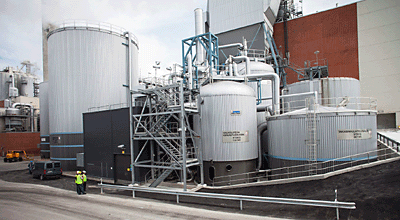 Metsä Fibre, Finland, has started up the world's largest single polysulfide cooking line's at its Joutseno mill in Finland. Technology for the preparation of polysulfide, and the digester modifications to enable production of the improved softwood pulp, were supplied by international technology Group Andritz, Graz, Austria.
Metsä Fibre, Finland, has started up the world's largest single polysulfide cooking line's at its Joutseno mill in Finland. Technology for the preparation of polysulfide, and the digester modifications to enable production of the improved softwood pulp, were supplied by international technology Group Andritz, Graz, Austria.
According to Joutseno Mill Manager Risto Joronen, who was also the director for this development project with Andritz, the use of polysulfide cooking liquor enables the mill to improve certain pulp qualities that benefits papermakers. One of those benefits is a reduction in specific energy to refine the pulp, resulting in lower operating costs for papermakers. There are also some enhancements to the fiber bonding due to the retention of certain hemicellulose materials in the pulp.
The Joutseno mill is also increasing its fiber yield, which makes the investment economically beneficial. As a result, the mill is able to reduce the loading of its recovery boiler, which allows it to improve production capacity.
The polysulfide process modifies conventional white cooking liquor to "orange liquor" (named due to the characteristic color of the modified liquor) by oxidizing sodium sulfide in the liquor to polysulfide. The plant provided by Andritz is based on the proven MOXY process (white liquor sulfide-to-polysulfide conversion) already installed in several mills around the world. The Joutseno mill is by far the largest single unit in operation worldwide.
Andritz also modified Joutseno's cooking plant to optimize the new process.
TAPPI
http://www.tappi.org/